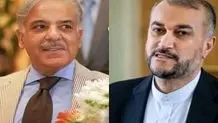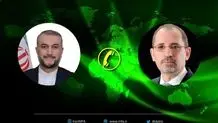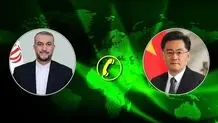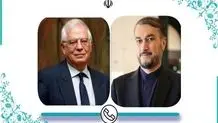In New York;
Iran FM meets counterparts, PGCC & UNGA chiefs
Iranian Foreign Minister Hossein Amir-Abdollahian held talks with some of his counterparts, the PGCC secretary-general and the UN General Assembly president in New York.
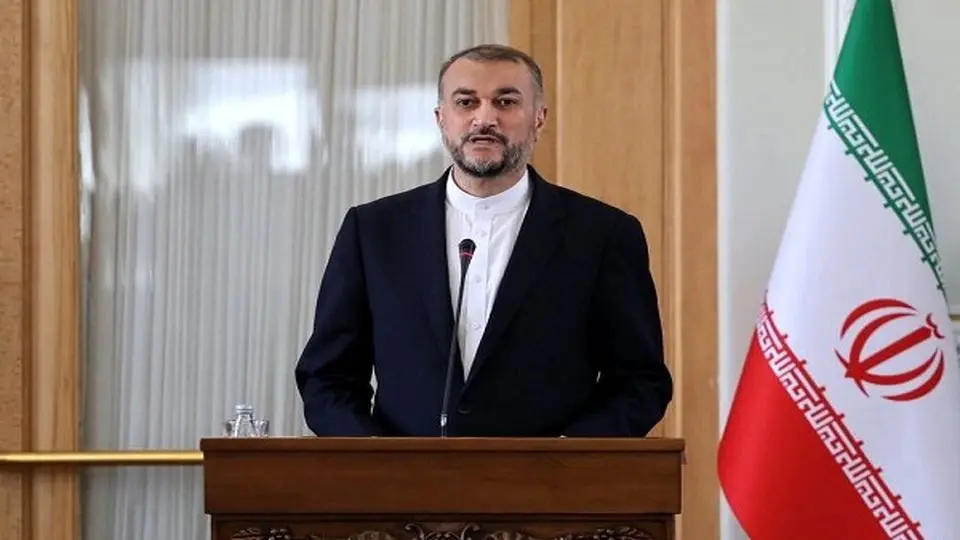
MEHR: Amir-Abdollahian met with his counterpart from Singapore on the margins of the annual session of the United Nations General Assembly on Wednesday.
In the meeting, the two sides underscored their interest in the expansion of trade and economic ties.
The top Iranian diplomat touched upon the massive economic potential as well as trade ports in Iran along with Singapore’s important trade and economic status, stressing the significance of tapping into the existing potential.
Iranian Foreign Minister Hossein Amir-Abdollahian held talks with some of his counterparts, the PGCC secretary-general and the UN General Assembly president in New York.
Amir-Abdollahian who accompanied Iranian President Ebrahim Raeisi to New York to attend the United Nations General Assembly meeting, met with a number of his counterparts and the Secretary-General of the Persian Gulf Cooperation Council and the UN General Assembly president.
Iranian foreign minister also met and held talks with Qatar’s Prime Minister and Foreign Minister Sheikh Mohammad bin Abdul Rahman Al Thani.
The two top diplomats exchanged views about bilateral issues as well as some regional and international issues of mutual interest.
Amir-Abdollahian praised the Qatari government’s constructive role in advancing bilateral issues including the recent prisoner exchange between Iran and the US.
The Iranian foreign minister expressed pleasure with the growing trend of relations between Tehran and Doha in various fields. Stressing the need to strengthen this aspect, Amir-Abdollahian said Iran is ready to strengthen cooperation in regional and international fields.
Sheikh Mohammad bin Abdul Rahman Al Thani, for his part, extended greetings from the Qatari Emir to the leaders of Iran, voicing his country's readiness to bolster ties in various bilateral, regional and international areas.
He further said Qatar is prepared to continue its constructive and helpful role in issues of mutual interest and underlined the necessity of taking advantage of the positive climate in the region to further efforts to that end.
He also voiced his country's readiness to continue negotiations with Iran in the near future in Tehran or Doha, which was welcomed by Amir-Abdollahian.
Amir-Abdollahian met with his Djiboutian counterpart Mahamoud Ali Youssouf on the sidelines of the UN General Assembly summit in New York.
In the meeting that was held in a friendly atmosphere, Amir-Abdollahian said, “We have always witnessed very good developments in relations between Iran and Djibouti over many years and there are different areas in which we can work.”
He added that Iran welcomes the expansion of ties with Muslim and brotherly countries and is interested in putting back ties with Djibouti on the right track.
Amir-Abdollahian went on to stress that we see Djibouti as a friendly and brotherly nation, adding that Iran considers relations with that important Muslim country in the Horn of Africa highly important and warmly shakes hands with its Djiboutian brothers.
“We can establish robust ties and expand our cooperation in all areas,” said the Iranian foreign minister.
Pointing to the capabilities of the Islamic Republic of Iran in scientific and technological fields, the Iranian foreign minister said Iran is ready to share these capabilities with Djibouti.
He further extended greetings from the Iranian president to high-ranking officials of Djibouti and invited Mahamoud Ali Youssouf to visit Iran as soon as possible.
The Djiboutian foreign minister also said he was pleased to meet with Amir-Abdollahian, saying Iran and Djibouti have always had good and constructive relations in the past and that his country is fully prepared to strengthen these constructive and good ties in light of the good possibilities of both sides.
He described solidarity among Muslim nations as important and said it is necessary for Islamic countries to be together in critical situations.
Mahamoud Ali Youssouf stressed that the Republic of Djibouti welcomes the establishment of inclusive relations with Iran.
He also said the two sides have always worked together and this cooperation is continuing and “we are ready to strengthen the relations.”
Amir-Abdollahian and the Djiboutian foreign minister also discussed some regional issues of mutual interest and others that are important to Islamic countries including the Palestinian issue. Both foreign ministers reaffirmed their support for the Palestinian nation and the Palestinian cause.
Hossein Amir-Abdollahian also met with his Lebanese counterpart Abdullah Buhabib on the sidelines of the UN General Assembly session in New York.
In the meeting, the two top diplomats discussed issues of mutual interest and the latest state of the political process in Lebanon.
Amir-Abdollahian said Iran will not hesitate to help with this political process based on any decision that the Lebanese adopt.
The Iranian foreign minister stressed the importance of the Palestinian issue and reaffirmed Tehran’s continued support for the Resistance in Lebanon and Palestine in the face of threats by the Zionist regime.
He further underlined the need for Muslim countries to continue supporting the Palestinian people.
Buhabib, for his part, referred to the latest developments in Lebanon and appreciated the Islamic Republic of Iran’s constructive support of his country.
Hossein Amir-Abdollahian also met with his Lebanese counterpart Abdullah Buhabib on the sidelines of the UN General Assembly session in New York.
In the meeting, the two top diplomats discussed issues of mutual interest and the latest state of the political process in Lebanon.
Amir-Abdollahian said Iran will not hesitate to help with this political process based on any decision that the Lebanese adopt.
The Iranian foreign minister stressed the importance of the Palestinian issue and reaffirmed Tehran’s continued support for the Resistance in Lebanon and Palestine in the face of threats by the Zionist regime.
He further underlined the need for Muslim countries to continue supporting the Palestinian people.
Buhabib, for his part, referred to the latest developments in Lebanon and appreciated the Islamic Republic of Iran’s constructive support of his country.
Iranian Foreign Minister and the Secretary of Foreign Affairs of the Philippines, Enrique Manalo discussed the latest developments in bilateral ties.
Expressing his satisfaction with this meeting, Iran's top diplomat said that the ancient and friendly relations' history between the two countries is a very good investment for expanding future relations.
Amir-Abdollahian said that Tehran is ready to expand its commercial ties with Manila and cooperate in scientific and technological fields and other fields of interest.
Referring to the global movement towards multilateralism, he termed this process as an opportunity for Iran and the Philippines, adding that both countries have common views and good cooperation in international organizations.
Touching on the good relations and cooperation between the two countries, the Secretary of Foreign Affairs of the Philippines for his part said, "We have various fields for cooperation and can provide the basis for cooperation between the two countries in new fields of interest."
Manalo emphasized the importance of strengthening cultural exchanges between the two countries.
He added that we have a common point of view regarding respect for international law and support for multilateralism in the international sphere.
He noted that Iran and the Philippines's ties have always been good both at the bilateral and international levels, including in the United Nations, voicing readiness to continue bilateral cooperation.
Amir-Abdollahian also met with the Secretary-General of the Persian Gulf Cooperation Council, Jassem Mohamed Albudaiwi on the sidelines of the UN General Assembly summit in New York.
The minister stressed the importance of expanding ties between Iran and the southern countries of the Persian Gulf.
He then referred to his recent trip to the Persian Gulf countries and Iran’s initiative, saying, “We proposed the formation of a forum for dialogue and cooperation.”
Amir-Abdollahian added that today, regional leaders show more interest in cooperation than talks, [and] therefore Iran’s initiative was welcomed.
He underlined that any differences in the region must be resolved through constructive diplomatic talks.
Amir-Abdollahian further invited the PGCC secretary general to visit Iran, which was welcomed by Albudaiwi.
Albudaiwi also welcomed the growing trend of ties between Iran and the member states of the Persian Gulf Cooperation Council, saying the Persian Gulf is a strategic region and fortunately, in this new environment, there is room for greater cooperation between regional countries.
The PGCC chief said tension in the region is harmful to all sides and that the body welcomes Iran's efforts to boost regional cooperation.
He added that it is necessary to step up efforts to increase dialogue and present initiatives for the purpose of strengthening cooperation.
Amir-Abdollahian and his Emirati counterpart Abdullah bin Zayed Al Nahyan have reviewed bilateral relations in New York.
During the meeting, Amir-Abdollahian thanked his Emirati counterpart for his warm hospitality and the very good talks during his recent trip to the UAE, and said, “We are witnessing rapid changes in the region and it is necessary to implement the bilateral deals between the two countries at the same pace.”
Amir-Abdollahian said he was satisfied with the high volume of trade exchanges between the two countries, noting that in his meeting with UAE President Sheikh Mohamed bin Zayed in Abu Dhabi they jointly emphasized achieving a higher ceiling for commercial ties, as well as the necessity to prepare for the next session of the joint cooperation commission between Iran and the UAE.
The Iranian foreign minister also renewed the invitation of Iranian President Ebrahim Raisi to his UAE counterpart, Sheikh Mohamed bin Zayed, as well as the invitation to his UAE counterpart to visit Iran.
For his part, Sheikh Abdullah bin Zayed while expressing his satisfaction with the meeting and voicing gratitude for the invitation, announced his willingness to visit Iran in the near future. He added it was necessary to make the preparations for the UAE president’s visit to Iran.
The UAE foreign minister also announced his country’s readiness to hold the next meeting of the joint commission of the two countries and said, “We are waiting for the finalization of the proposed date.”
He also stressed that an agreement should be signed to avoid double taxation in order to help boost trade between the two countries.
The two sides also discussed some other areas of cooperation between the two countries during the meeting, including consular cooperation.
Syria’s newly-appointed Deputy Foreign Minister Bassam al-Sabbagh, who heads the Syrian delegation taking part in the United Nations General Assembly (UNGA) session, met with Iran’s foreign minister.
During the meeting, Amir-Abdollahian referred to his good talks with the Syrian President, Prime Minister, and Foreign Minister during his recent visit to Damascus, saying, “Fortunately, consultations and cooperation between the two countries continue at the highest level.”
The Iranian foreign minister stressed that all parties should support the consolidation of stability and security in Syria and respect the sovereignty and territorial integrity of the country.
He said Iran will continue its principled policies in supporting the Syrian government and nation in the international arena, including at the United Nations.
Bassam al-Sabbagh, in turn, expressed his satisfaction with the cooperation between Iran and Syria in international assemblies, including the UN, and said, “Unfortunately, some Western countries take advantage of international forums and mechanisms for their own political goals.”
The Syrian deputy foreign minister stated that the US sanctions are one of the most significant reasons for the increase in the hardships of the Syrian people and said although the Syrian government is doing its utmost to reduce the sufferings of the people, the Syrian people suffer the most from the embargos.
During the meeting, they also exchanged views on the latest developments in Syria.
Amir-Abdollahian also met and held talks with President of the United Nations General Assembly (UNGA) Dennis Francis in New York.
He expressed satisfaction with the meeting and said, “Your attention to human values in the current complex developments of the world is very valuable, and you have the responsibility of chairing the UN General Assembly at an important juncture of international developments and you have this important opportunity to pursue your precious ideas.”
The Iranian Foreign Minister added, “Today, it’s an important fact that countries pay attention to multilateralism and you have a key role within this framework. In this context, it is very important that the developing countries feel that their voice is heard at the UN General Assembly.”
Amir-Abdollahian mentioned that the UN is a place where all governments should be able to use it to speak out and have an influential role.
He added, “We in Iran do our best to materialize human, religious and moral values. Therefore, I would like to stress in this regard that we do not consider war as a solution in relations between countries and we believe that differences and crises should be resolved through dialogue.”
The Iranian foreign minister said, “We do not think war is a solution in Ukraine. Also, the fate of the original Palestinian nation is important to us, and we believe that the UN, as an authority for peace and security, should pay special attention to the Palestinian people’s rights.”
He emphasized, “It is important for us that decisions in the General Assembly are made with maximum collective participation, which will grant more credit to the General Assembly as a result.”
In response to a question by the President of the General Assembly, the Iranian foreign minister updated him on the latest developments in the talks on the Joint Comprehensive Plan of Action (JCPOA) and lifting sanctions, saying, “We, as the Islamic Republic of Iran, are moving in the right direction of diplomacy.”
Meanwhile, the President of the UNGA said he was pleased with the meeting and highlighted Iran’s old and rich civilization.
He said, “Despite the complex conditions and a myriad of international tensions as everyone is trying to stand their ground, we are trying to respect the diversity and at the same time help resolves problems and make the world a better place for humanity and their children in the future.”
He added, “We will try to reconstruct solidarity and trust in the UN General Assembly and help resolve international issues and problems, but we know it is not an easy task, however, we will make efforts on this path.”
Moreover, Amir-Abdollahian and his Maltese counterpart Ian Borg met and discussed on Thursday issues of mutual interest.
The Iranian foreign minister pointed to the good records of the two countries' commercial cooperation in the past, emphasizing that mutual cooperation will be on the right track soon.
He also referred to the cooperation capacities of the two countries in the fields of fisheries, agriculture, medicine as well as technology, voicing Iran’s eagerness to strengthen ties with Malta in the areas of port development and shipping.
Amir-Abdollahian went on to highlight Malta's membership in the UN Security Council, describing it as an opportunity to play a constructive role in international justice.
Iran's foreign minister also briefed the top Maltese diplomat on negotiations for the revival of the 2015 nuclear deal, officially known as the Joint Comprehensive Plan of Action (JCPOA), and the removal of US-led sanctions against Tehran.
Borg, for his part, voiced his country’s enthusiasm to foster friendly and constructive cooperation with Iran.
The senior Maltese diplomat also underlined the need for interactions and dialogue in order to have a better understanding of international developments, stressing that his country supports positive developments in Iran’s foreign and regional relations.
آخرین اخبار Iran را از طریق این لینک پیگیری کنید.

